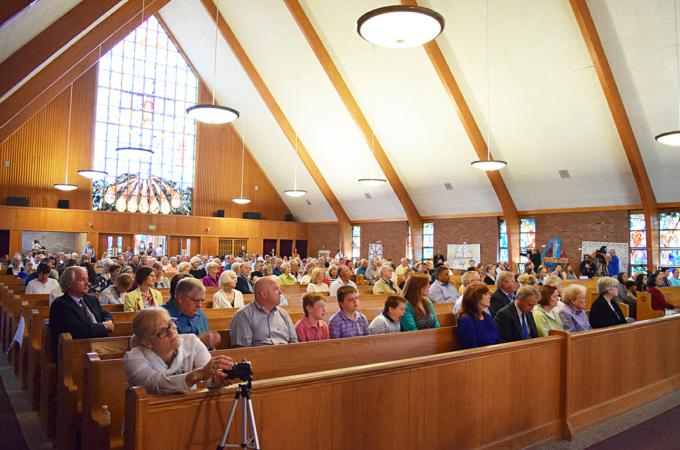Vigil at closed Scituate church ends
SCITUATE -- For the first time in nearly a dozen years, St. Frances X. Cabrini in Scituate stands vacant. Former parishioners spent 4,234 days occupying the building in protest of its closure by the Archdiocese of Boston.
The Vatican's highest court ruled against the vigilers in two rounds of appeals. Then, the archdiocese sought recourse in the civil courts. The United States Supreme Court elected not to take up the case, leaving the lower court's ruling in favor of the archdiocese in place. The court gave the vigilers two weeks to move out; they had until midnight on May 30.
On the last Sunday in the church, May 29, about 200 people gathered for a final celebration. For more than 11 years, they held lay-led communion services with hosts they say were consecrated by sympathetic archdiocesan priests whose names they will not disclose. On May 29, a former priest celebrated Mass.
The group of vigilers, who call themselves the Friends of St. Frances, said their next step will be to hold both Masses and lay-led communion services at The Satuit Lodge of Freemasons in Scituate. Within the next two years, they plan to buy property near their former church and start building a new church. They say they offered to buy the St. Frances building but the archdiocese would not agree to sell to them. They have severed ties with the archdiocese but claim to be part of the "one, holy, catholic and apostolic church."
At the May 29 service, many were visibly moved by the final service held at the church. Afterward, they expressed anger and sadness.
"There goes my makeup, down my cheeks," said longtime parishioner Nancy Shilts after she began crying. "It's home. It's still holy in here. It should never be closed."
In a May 28 statement, the archdiocese acknowledged the Friends of St. Frances' "understandable" sense of loss and invited them into dialogue.
"The most important step we can now make as a Catholic family is to continue to work towards reconciliation. In this regard, we offer the assistance of archdiocesan representatives to the former parishioners with the hope that this can lead to them rejoining parishes of the Archdiocese of Boston," the statement said.
In an interview after the May 29 service, Maryellen Rogers, spokesperson for the Friends of St. Frances, said that the offer of reconciliation is too little, too late. She said, from the beginning, the archdiocese presented only one option -- to close St. Frances and move parishioners to a new church.
She believes the parish was targeted for closure because it stands on 30 acres of oceanfront property. Early on, St. Frances parishioners offered to sell off 25 acres in order to reopen the parish, but that proposal was also turned down by the archdiocese, she said.
The archdiocese suppressed St. Frances in 2004 as part of a parish reconfiguration process that ultimately led to the closure of about 50 churches. The archdiocese said that changing demographics, decreasing Mass attendance, a shortage of priests and the rising cost of maintaining properties necessitated the closings. At the time, one-third of all parishes were operating in the red, and in the city of Boston alone deferred maintenance costs topped $100 million.
Originally, more parishes were slated to be shuttered, but in October of 2004, Cardinal O'Malley halted the reconfiguration process and appointed a Reconfiguration Review Committee. He accepted all 17 of their recommendations, including the reversal of several church closings, the following year.
Catholics at St. Frances and 10 other parishes appealed the decision through the Vatican court system. The Vatican courts denied the final appeals in 2010. Several parishes sought recourse in a second round of appeals, objecting to how the church buildings would be "relegated," or converted to non-church use; the Vatican denied those appeals in 2014. When the Friends of St. Frances remained in the church, the archdiocese turned to the civil courts, which also ruled in their favor.
In their statement, the archdiocese noted that Cardinal O'Malley had kept his promise to let the vigils continue as long as there was pending litigation and expressed "prayerful hope for reconciliation."
"Despite our disagreement over the closing of the parish we have never lost sight of the fact that we share a commitment to follow Jesus Christ in and through the Roman Catholic Church, which he established," the statement said.



















